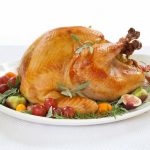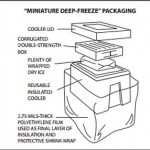During the holidays, hotlines for consumer cooking and baking questions light up. Many people cook traditional foods this time of the year, and have questions about food safety or because the recipes are vague. FoodSafety.gov is answering three of the most common questions they get this time of year about preparing and storing holiday foods. Question one is: I bought a fresh turkey last week. Is it still safe to eat? How long can I keep a fresh turkey in the fridge? Fresh turkey should only be purchased one or two days before you cook it. If you do not cook the bird within two days, freeze it. It can be frozen indefinitely, but should be cooked within 1 year for best quality. Question two is: Can holiday meats be cooked at temperatures below 250°F? And can I use an oven bag … [Read more...]
Food Safety Tips for the Holidays
FoodSafety.gov is offering food safety tips for the holidays. Keep everyone safe from foodborne illness during these special times by following these practices. Always wash your hands with soap and water before and after preparing food. And wash them thoroughly after you touch raw meat, raw eggs, or unwashed vegetables, and before eating or drinking. Always cook food thoroughly to a safe internal temperature and test that temperature with a reliable food thermometer. Meat, poultry, seafood, and eggs can carry pathogenic bacteria that can make someone very sick. You can see the minimum safe internal temperatures for these foods at the Foodsafety.gov web site. And remember that meats should rest for three minutes after you remove them from the oven or grill. The temperature … [Read more...]
Stay Food Safe This Fourth of July
The U.S. Department of Health and Human Services (HHS) and USDA are offering tips to Americans to stay food safe this Fourth of July holiday weekend. Outdoor cooking can include special hazards that can make you and your guests sick. First, grill like a PRO. Whenever you are cooking meats on the grill, whether they are burgers, chicken, steaks or ribs, use a food thermometer. First, PLACE the thermometer in the thickest part of the meat. If you are cooking a thinner piece of meat such as hamburgers, insert the thermometer from the side. Then, READ the temperature. Wait about 10 to 20 seconds for an accurate reading. For beef, pork, lamb, and veal steaks, roasts and chops, meat should reach a temperature of 145°F with a three minute rest time to be safe. Ground meats should be … [Read more...]
Sending Food This Holiday Season? Pack it Safely.
Foodsafety.gov is offering tips for safely sending food through the mail this holiday season. If the food you are packing is perishable, food poisoning is a risk. And if you are ordering food from a company, you should make sure they understand how to handle perishable goods. When ordering from a company, make sure that they send meats, poultry, and processed foods such as salads and potatoes, cold or frozen and packed with a cold source. The preferred cold source is dry ice to keep the package temperature as low as possible. The food should also be packed in a foam container or a heavily corrugated cardboard container to hold in the cold. And the food should be delivered as quickly as possible, preferably overnight. If you are packing food yourself to send through the mail, … [Read more...]
Memorial Day and Summer Holiday Food Safety Tips from the FDA
The FDA has released tips on eating safely this Memorial Day. Safe food handling when eating outdoors is important and can be tricky, especially when the weather is warm. When you are transporting food for a picnic or potluck, make sure to keep cold food cold and hot food hot. Cold food should be stored at temperatures below 40°F to prevent bacterial growth. You can pack meat, poultry, and seafood while still frozen so they stay colder longer. Organize cooler components. A plain picnic basket usually isn't insulated enough to hold perishable foods. Use two coolers, with beverages in one and perishable foods in another. As people take out drinks, they won't expose food to warm outdoor temperatures. Keep coolers closed too. Keep raw meat, poultry, and seafood wrapped and separate … [Read more...]
USDA Offers Tips for a Safe Holiday Season
The USDA is offering tips to help keep your holiday season safe. Whether you're entertaining at home or carrying food to a potluck, there are rules you need to follow to make sure the food you have prepared and are serving doesn't make someone sick. First, if you have specific concerns, call the USDA Meat and Poultry hotline at 1-888-674-6854 or chat with a food safety speciality at AskKaren.gov. When shopping, make sure you keep raw meat, poultry, seafood, and eggs away from other foods in the cart. Buy cold and frozen foods last so they stay cold. And always place raw meat, poultry, and seafood in a separate bag at checkout. Go home immediately after you are finished shopping so food doesn't get to unsafe temperatures in the trunk of your car. Make sure you follow the rules of … [Read more...]
USDA Offers Food Safety Tips for Fourth of July Celebrations
The USDA is offering food safety tips for Americans celebrating Independence Day. Salmonella infections can happen if you serve unsafe food that is not handled or prepared correctly. First, make sure you separate raw meat products from ready to eat raw foods in your shopping cart and on the way home. Put raw meat into bags and containers separate from produce, snack foods, and breads. Keep them separate in the fridge and as you prepare the food too. Always cook hamburgers to 160°F as measured by a food thermometer. Wash your hands before preparing food and often while working in the kitchen. And keep food cool; always refrigerate perishable foods within 2 hours at room temperature; one hour if the ambient air temperature is above 90°F. The only way of ensuring doneness of meats and … [Read more...]
Consumer Reports Offers Holiday Food Safety Advice
Consumer Reports is offering food safety advice when you're cooking some type of meat for the holidays. Ham, beef and pork roasts, turkey, and duck are usually only prepared once or twice a year, so most cooks are unfamiliar with the food safety risks posed by these foods. When buying meats from a stand-alone refrigerator case, don't take the package on top. And if the packages extend above the top of the case, there's a very good chance that meat has entered the temperature danger zone above 40 degrees F. Francis Largeman-Roth, R.D., said, "those cases only keep things truly cold as far as the walls of the case go up." Store these large cuts of meat properly. A fresh turkey should be stored in the refrigerator for only one or two days. Pork and beef roasts can be in the fridge for … [Read more...]
USDA Offers Tips on Sending Care Packages to U.S. Military
This holiday season, many people are sending care packages to those in the U.S. military who can't be home for the season. The USDA is offering tips about the best things to mail and how to make sure the foods you send stay safe to eat. Food gifts that are mailed should not be perishable. The foods should also be able to tolerate a range of temperatures and not break even with rough handling. The recommended foods for mailing include dried products such as jerky and fruits, shelf stable canned foods, and condiments such as hot sauce that could be used to add flavor to MREs. Homemade cookies, candy, and low-moisture breads and bar cookies are also recommended. Mail order foods are a good choice too. Any shelf stable food that you can order online can be sent to military personnel. … [Read more...]
Stay Food Safe This Fourth of July
Several organizations are publicizing food safety for the Fourth of July holiday. The non-profit group Partnership for Food Safety Education has released several videos called Ugly Bug to remind consumers to cook chicken to 165 degrees F, to cook burgers to 160 degrees F, and to avoid cross-contamination by using clean plates to hold cooked food. Eatright.org has released information about food safety as well. Always clean the grill before you cook, and wash your hands frequently before preparing food, during preparation, and before you eat. Don't use the same utensils for cooked and raw foods. Always use a food thermometer to determine when food is cooked; you can't use other methods, such as visual or textural cues to tell that food is safe to eat. Never let perishable foods sit out … [Read more...]










